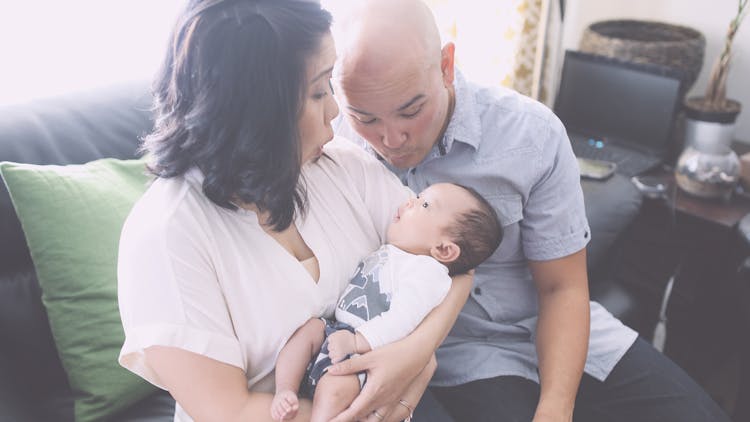If your kid seems a little disconnected, sad, quiet, over the top with silliness, insecure, or rebellious, it probably comes down to answering one question: “Who am I?”
We all sometimes struggle with our identity, but it’s especially prevalent in our kids. They’re asking questions like, Who am I? What makes me special or unique? What value do I bring? Do I have any influence? What was I made for?
These are big questions, but they usually emerge as early as second or third grade—only to become more challenging through middle school and high school. Kids often find the answers to those questions in culture, in other people’s opinions of them, and through the people they compare themselves to—which can sometimes leave them feeling unworthy or more unsure.
On the quest to answer these big questions, kids strive to become good at something or valuable to someone—the straight-A student, the gymnast, the artist, the football player, the quarterback’s girlfriend, or the teacher’s pet—searching for meaning. Although it’s wonderful to excel at a sport or in academics, finding worth in an activity or a person is dangerous.
Instead, when a child begins their relationship with Christ, they can start to see themselves the way God sees them—as a child of God. Then they can start to realize that our identity is not found in who we are but in Whose we are.
1 John 4:4 NLT says:
But you belong to God, my dear children. You have already won a victory over those people, because the spirit who lives in you is greater than the spirit who lives in the world.
That truth is critical for our kids to know. The power of the Holy Spirit within them is actually stronger than the voices of others.
Some of our kids have had negative labels placed on them by peers, teachers, coaches and maybe even their parents inadvertently. Whether through direct comments or the way they are treated, kids “hear” that they don’t measure up. For example, a coach says, “Speed it up. What, are you a turtle?” Friends say, “Only really pretty, skinny girls get picked for homecoming.” A teacher only rewards kids with straight As with cookies on Fridays. A parent says, “Oh, I love her to pieces, but she’s definitely my lazy one.” Over time, these labels shape a child’s personal identity.
As parents, when we see our child feeling insecure, hurt, unsure of themselves, or disconnected, we want to swoop in and tell them how wonderful they are. We want to assure them that they are loved and valuable. We want to shower them with authentic compliments and point out all the best things about them. And we should do that. We are the greatest influence in our kid’s lives. Our words matter. By all means, don’t stop encouraging your children and loving them with that kind of truth. However, as painful as it sounds, how your kids view themselves and their worth has to be bigger than something we tell or show them. They won’t always be with us, and they have to own their identity for themselves.
So what else can we possibly do?
Here are three things you can do to help your child when they struggle with identity.
1. Seek. God is the ultimate source of truth, so encourage them by seeking God together, or depending on their age, give them space to seek God on their own. See the list below of great Bible Plans and resources we recommend to seek God together and discover the answer to “Who am I?” Through Scripture and prayer, you can help them write out what God says. Help them identify the gifts God has given to them. Are they compassionate, funny, relational, a good listener, creative, a helper, ambitious, responsible, strong, or wise? Remind them you are always there to point them back to truth, but ultimately, what God says is most important.
2. Dwell. It is so important as believers that we surround ourselves with other Christ followers. Getting your child in a small group in LifeKids or at Switch every week is critical. Here they will have another adult speaking truth over them and a solid group of friends who will encourage them. If you are part of our Church Online community, be intentional to have Christian friends around your children and choose an adult mentor to be another voice speaking God’s Word over them.
3. Tell. Verbalizing truth about themselves and sharing their own story helps kids solidify their Christ-centered identity in their hearts. Equally as important, using all of the gifts God has given them in a way that honors God “tells” the story of Jesus in their lives as well. We want to encourage this generation to share the goodness of Jesus in how they live and love others.
This month in LifeKids, Loop, and Switch, kids are learning all about these principles. Here are some more helpful resources for you:
Resources and Discussion Questions for Talking to Your Kid About Identity at Any Age
Here are some quick links to free resources about character for your kids at each developmental level. You can also try these discussion starters to begin a conversation with your kid about identity.
For Your Preschoolers (Or Verbal Toddlers—It’s Never Too Early to Start!)
- Start this Bible Plan together.
- Go on the Bible Adventure called “In the Beginning” together with your little ones. Each time they watch it, they’ll pick up new things.
- As you work through this topic together, try asking some of these questions:
- Who made everything in nature?
- What’s the most amazing creation God made?
- How can you remind people that God made them to be amazing?
For Your Elementary Kids
- Start this Bible Plan about identity.
- Watch the “The Truth About Me” Konnect HQ episodes with your child.
- As you work through this topic together, use these questions as a jumping-off place:
- What are some good ways to find out the truth about who you are?
- When we follow Jesus, what does God see: our sins or His love for us?
- What can you do this week to remind yourself that God loves you? What can you do to let others know God loves them, too?
For Your Preteens
- Start this Bible Plan about identity with your preteen. If they have their own Bible App account, invite them to join you in a Plan with Friends.
- Watch these great episodes of The Loop Show about identity.
- As you work through this topic together, ask the questions below:
- Have you ever felt ordinary, or not special? What did that feel like? How did you react?
- Read Ephesians 5:8 NLT. According to this verse, how are we supposed to live? How are we changed?
- What does it mean to “reflect God like a mirror”? If God is invisible, how do we reflect Him?
For Your Teenagers
- Encourage your teen to start a Bible Plan with their friends. Here are a few plans they could try: Identity, Potential, 8 Habits of an Influential Person, and Dangerously Influential.
- Ask your teen if they’ve seen the Switch episodes about identity.
- Talk to your teen about what identity is all about. Try asking the questions below:
- Do you believe you have the potential to make a difference? What things in your life hold you back from living up to your potential? What helps you believe that?
- Read Ephesians 2:10 NLT. Any initial thoughts? When you read this verse, what does it make you think about? What parts of that verse do you agree with? What parts are a little harder to believe? What makes you think that?
- What is one good thing that you can do this week that would help someone else? How are you going to do that?
Our friends at Axis have loads of additional great information on this topic in their Identity Conversation Guide. Check it out!


